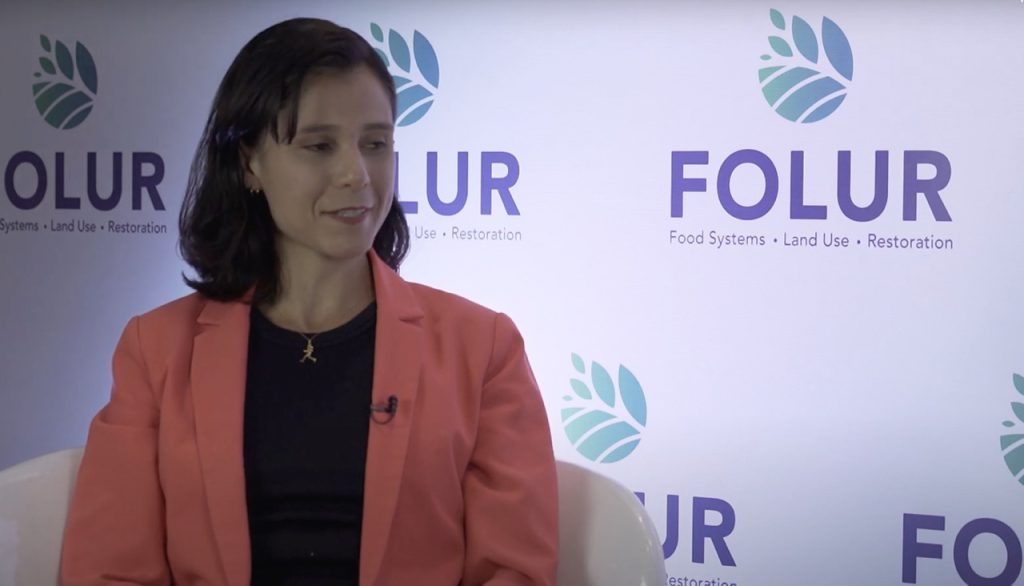5G in Africa: What’s its potential, Selasi Ahorlumegah?
Naa Oyoe Quartey
With its fast speeds and revolutionary potential, 5G stands out as a noteworthy milestone in the field of […]

At the Food Systems, Land Use and Restoration (FOLUR) event in São Paulo, an insightful discussion took place between Isabel Mesquita of the Global Landscapes Forum (GLF) and Sibelle de Andrade Silva, the Director of Sustainable Production at Brazil’s Ministry of Agriculture and Livestock. The key topics revolved around the present state of agriculture in Brazil, future strategies for more sustainable practices, and the obstacles in the path of developing a greener agricultural sector.
Brazil stands as a leading exporter of commodities, with soy and cattle topping the list. Silva was asked to shed light on the environmental challenges related to these industries in Brazil. Her response highlighted two intertwined aspects: the increasing demand for food security, and the need for producing more while using fewer resources. “We need to produce more and more but also use less and less,” Silva said.
She acknowledged the urgent necessity to restore degraded areas, especially pastures, to prevent additional strain on new forest regions. Silva identified this as a crucial challenge and a significant opportunity. A recurring theme was the promotion of sustainable practices, acknowledging that while some producers have adopted them, others have not yet done so. “We want to communicate those practices even better and expand their adoption through programmes such as FOLUR,” she added.
Regarding the integration of less sustainable agribusinesses within the scope of the FOLUR program, Silva attributed the challenge of adoption to the need for technical assistance. The aim, she explained, is to provide more technical assistance to producers, particularly those of small and medium scale, who may be unaware of sustainable practices. Silva emphasised that adopting sustainable practices not only benefits the environment, but also increases income by improving soil quality and enhancing productivity.
Brazil’s government has launched the ABC+ Plan, aiming for a low-carbon agricultural sector. An ambitious target under this initiative is the recovery of 30 million hectares of degraded pastures. However, to achieve this, Silva highlighted the importance of providing technical assistance to producers.
Efforts are being made to procure funding and access various state management committees. The goal is to create a synergic network of public sector, private sector, and municipal governments to facilitate producers’ access to sustainable agriculture tools. Silva concluded, “Many people don’t adopt sustainable practices, not because they don’t want to, but because they haven’t been connected with the right knowledge. So, for us, technical assistance is key.”
Through the dialogue with Silva, it was apparent that Brazil is actively working towards creating a greener and more sustainable agricultural landscape. As they grapple with challenges, Silva’s vision suggests a promising horizon ahead.
Discussing the main challenges faced while initiating the programme and the potential hurdles for the future, it was shared that in the past, difficulties were encountered in effectively conveying and disseminating sustainable practices across the agricultural sector in Brazil. However, the present situation is viewed as a new phase, enriched by fortified partnerships with the Ministry of Environment and Climate Change.
“Climate change is the central issue driving the entire discourse around sustainable agriculture,” the representative stressed, underlining the urgency now permeating government actions. This alignment between the Minister of Agriculture and Minister of the Environment on combatting climate change and endorsing sustainable agriculture was also highlighted.
Past challenges were put into perspective, with the focus primarily on the present opportunity to increase sustainable practices, overcome obstacles, and encourage mutual aid. “We are seeking to make sustainable practices the rule in Brazil. We see this as a challenge, but also an opportunity,” the representative stated, alluding to the positive momentum and internal coordination within the government.
In concluding the discussion, the emphasis was laid on a crucial maxim held by the Ministry of Agriculture in synergy with the Ministry of the Environment and Climate Change: the absolute possibility to produce, conserve, and preserve. The assertion made clear that these were not antagonistic themes. It was recognised that considerable effort in public policy would be needed to put it into greater practice, but the goal was clear – making production and conservation a motto, and establishing sustainable agriculture as the norm in Brazil.
“So, the message I would like to leave you with,” Sibelle de Andrade Silva said, “is that our Ministry of Agriculture and Livestock is committed not only to the FOLUR programme but also to all opportunities that we may have to make agriculture increasingly green, innovative, and sustainable.” This pledge encompasses working in partnership with all other entities operating in the environmental arena, reinforcing the integrated and collaborative approach towards a greener, more sustainable future for Brazil’s agricultural sector.
Watch the entire interview here:

With its fast speeds and revolutionary potential, 5G stands out as a noteworthy milestone in the field of […]

Let me take you on a captivating journey through my intriguing conversation with Antonia Azoitei, a versatile artist […]